Poland: a work haven for Georgians

The sound of various dialects from Western Georgia fills the air at Kutaisi International Airport, as passengers wait to board their Wroclaw-bound flight.
Airport workers explain to an elderly man how to register for his flight and get through passport control, while another goes through security with just a plastic bag instead of a backpack or suitcase.
A group of men — seemingly local rural residents — are having a large and expensive dinner in the duty-free zone. Some of them are chatting on the phone, sharing their plans with their friends: to spend the night at Wroclaw airport, and then to immediately set out looking for work.
This is our first look at Georgian labour migration to Poland.
•Georgian immigrants in Europe sending more money home than those in Russia
•Georgian citizens in Europe – without visas, without asylum
•South Africans setting up in rural Georgia: reasons, challenges and hopes
Guram Jojua, 64, is from a village in west Georgia. He flew from Kutaisi to Wroclaw, but the sights of this beautiful European city are of little interest to him. Like many other passengers on the plane, he is here to find a job.
Guram has a plantation of 900 hazelnut trees in his village. But after the invasion of the stink bug, his harvest was destroyed, and he has no other source of income.
Work in Poland, even if temporary, is his only hope.
Moreover, his son-in-law has been working in Wroclaw for a year now.
“I am sure that they will help me and find a job,” Guram tells us.
Why Poland?
Over the past two years, Poland has become one of the main areas for labour migration from Georgia.
Unemployment in Georgia is at 12.7 per cent, according to the official data of 2018.
The road to Russia is practically closed due to the conflict and the difficulty Georgians have in obtaining visas.
In recent years, Greece, Turkey, Italy and Germany were the main migration destinations for workers from Georgia.
But Poland is distinguished by the fact that work in this country is legal.
For citizens of several post-Soviet countries – Ukraine, Belarus, Russia, Moldova, Georgia and Armenia – a work permit is issued in a simplified manner. For the citizens of Georgia, this is practically the only chance to get a legal job abroad.

Poland’s economic growth in 2018 was 5.1 per cent. The country’s GDP has been growing continuously for 26 years in a row. Poland’s economy, unlike other European countries, avoided a serious collapse during the 2008–2009 crisis.
The primary negative consequence of the economic boom is the shortage of labour in the country.
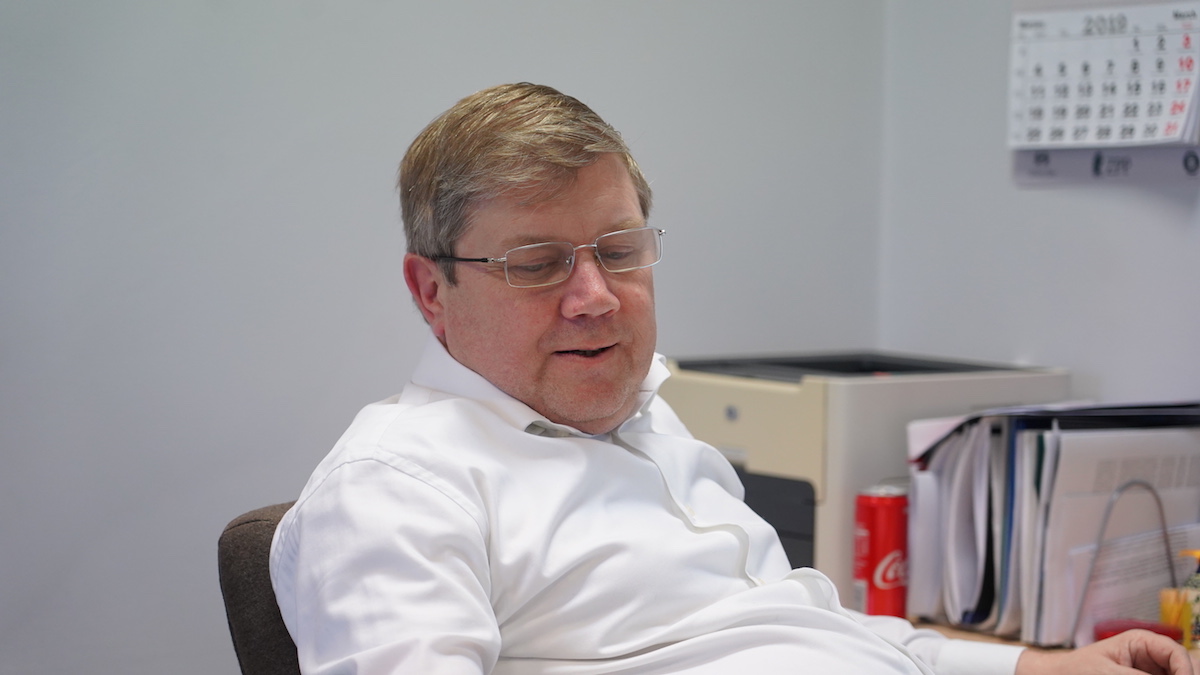
“Today, Poland is in a difficult demographic situation. Every year 700,000 people leave the labour market and only 400,000 enter. That’s a loss of 300,000. This has been going on for several years. The country simply does not have enough hands,” says Cezary Kaźmierczak, the head of the Union of Entrepreneurs and Employers of Poland.
Poland loses its own workers to the countries of Western Europe and Scandinavia – salaries are much higher there, and Poles, as EU citizens, have the right to work there.
Therefore, Poland, in order to compensate for the loss, is trying to attract labour from the countries of the former USSR and Asia.
Pay here amounts to about 11 zloty [about 2.5 euros] per hour. Workdays are often 10-12 hours a day, and unskilled workers can earn up to 700-800 euros per month.
Eurostat shows Poland took in the most migrants in Europe from non-EU countries in 2017: 683,000.
Kaźmierczak says that at the moment about 80 per cent of migrant workers in the country are Ukrainian citizens.
But the number of Georgian migrants is growing rapidly.
Up until 2017, there were few Georgians in the country. A year later, 12,000 Georgian citizens received temporary work permits.
Only 3,700 of them received work visas at the consulate in Tbilisi. The rest arrived in the country mostly as tourists, taking advantage of visa-free travel.
In February 2019, Poland came in 10th place in terms of money transfers by Georgian citizens – $2.2 million per month. Compare that with February 2018 when only 800,000 dollars were transferred from Poland to Georgia. In February 2017, that number was down to $127,000.
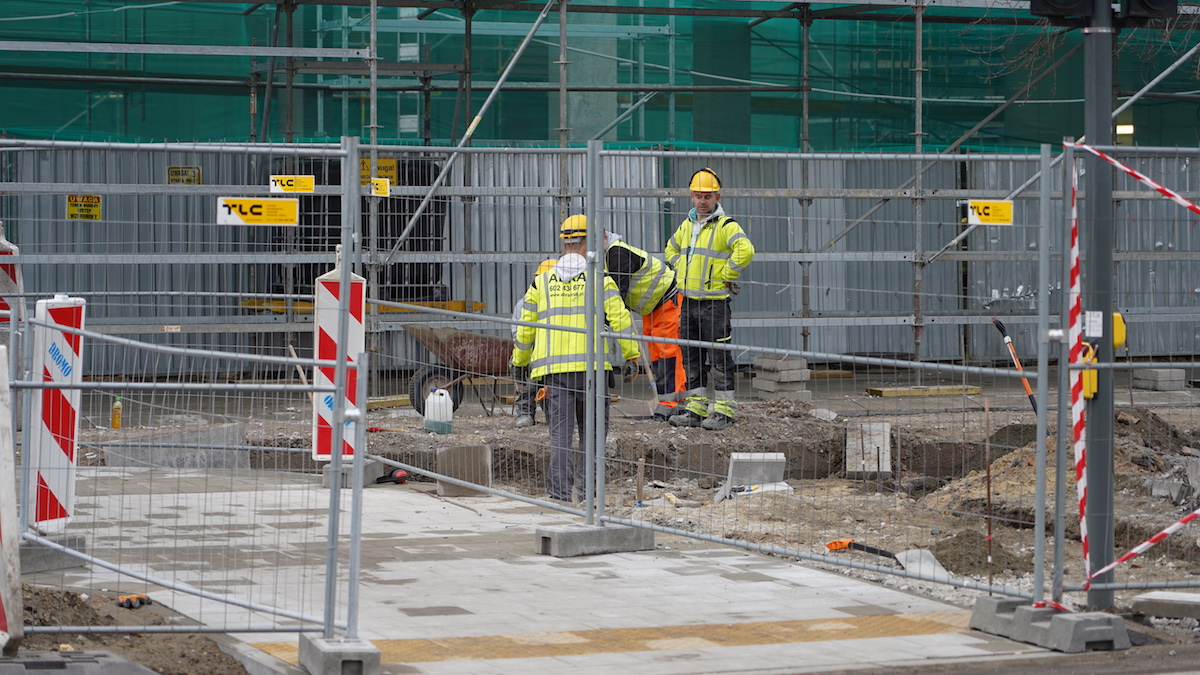
Is there enough work for all?
“My husband and I have decided to leave the children at home and go to work in Poland. Please help us find some work.”
This is the text of a post found on a Facebook group for Georgians living in Poland. Most of the posts in the group are requests for work, or advice about how to get one’s documents in order. People generally find work quickly.
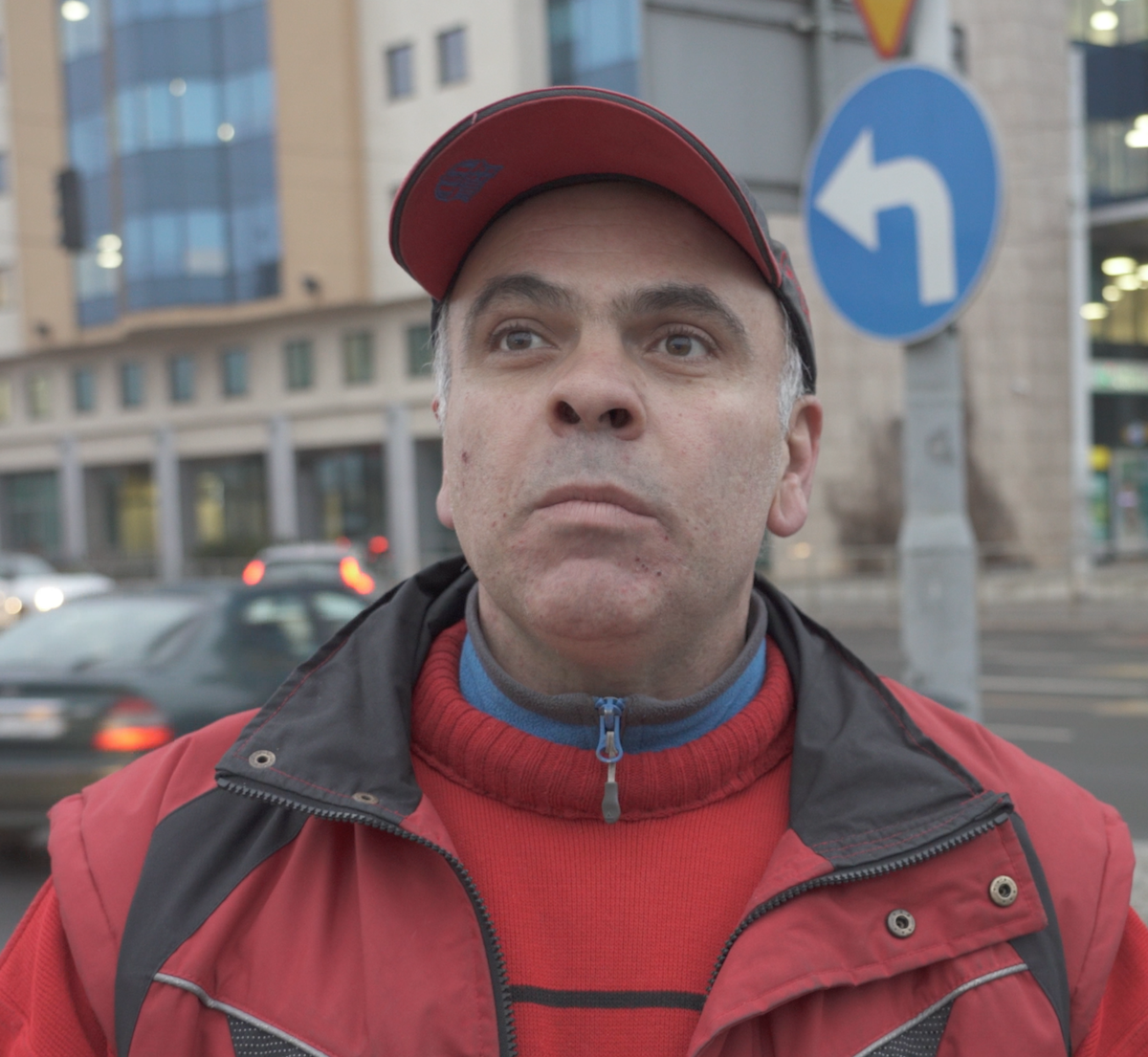
Guram Jojia’s son-in-law, Roland Kajaia, is 43. He came to Poland in December 2017.
He got a job at a construction site in Wroclaw installing a glass facade for 15 zlotys [about 3.5 euros] per hour. He didn’t have any experience. However, as he says, he was helped by experience in making furniture – this is what he did back in Georgia.
He stayed in a ‘hotel’ in which several people shared a single room, for about 100 euros a month.
Roland shows us a modern office building – his first job, and proudly describes the workflow, interspersing Georgian speech with Polish words – winda (elevator), wuzek (trolley) and kierownik (boss). In a little over a year he fully mastered spoken Polish. Now he has his third job in a small furniture factory, which he is quite pleased with.
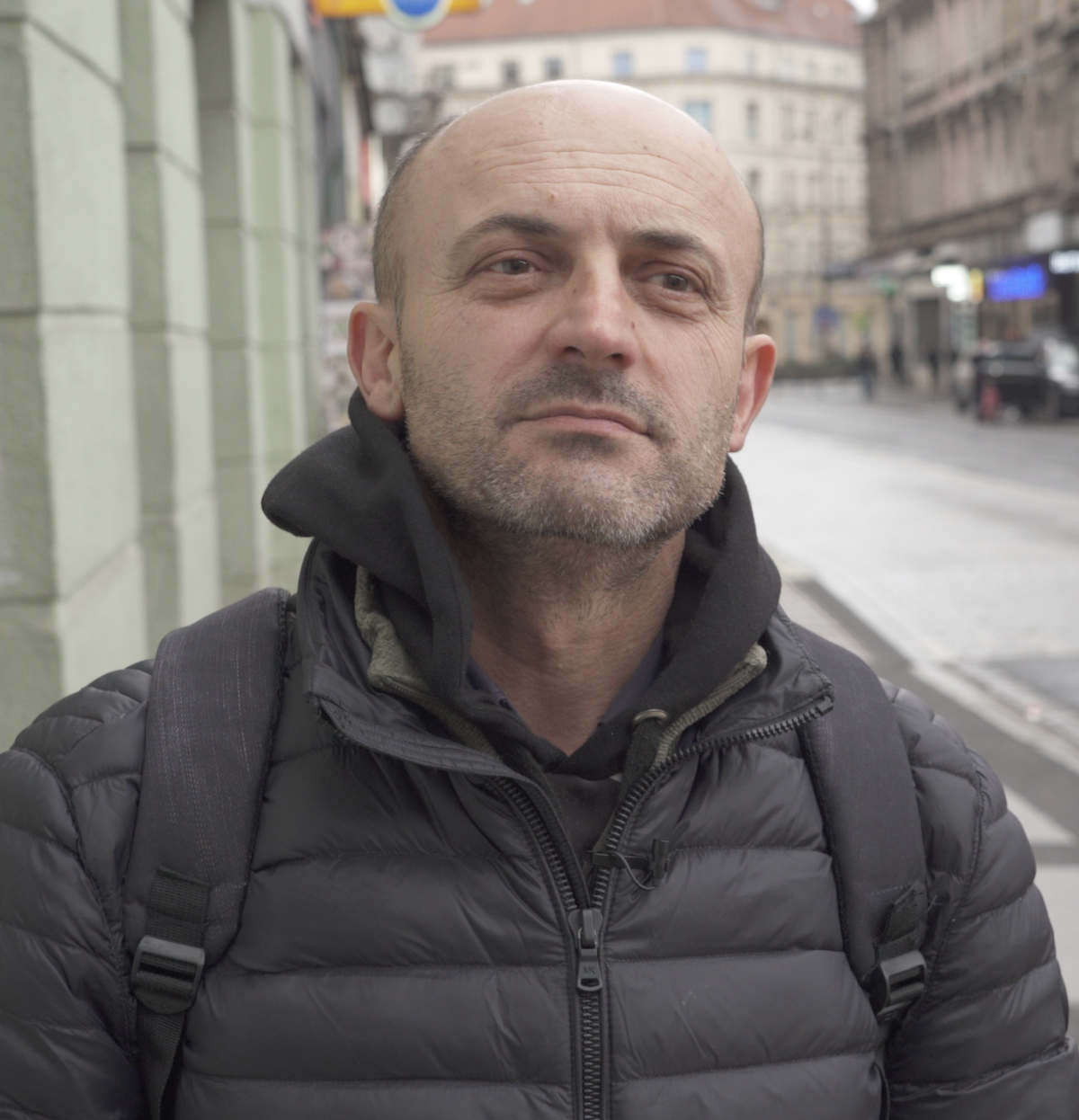
Zaza Lobzhanidze, 47, has been living in the city of Poznan for a little less than a year now. He works as a storekeeper at a warehouse for the large supermarket chain, Żabka.
“The main reason why I came here is the debts I have at the bank. All Georgia is in debt, I am no exception,” says Zaza.
Finding a job? Easy, Zaza says. You can come without a visa and apply on the spot for a temporary residence permit.
But not everyone is lucky the first time around.
Maia Nesuashvili took the word of a close relative and gave 1,500 euros to an intermediary for guaranteed work, housing and documents.
In the end, she did not receive anything from this promise.
For two months, she and other Georgians were waiting for a work permit, wandering “from hostel to hostel”. Then she got a job in a factory, but there were problems with obtaining a temporary residence permit.
In the end, Maia and her husband Zaza did manage to find a job with a municipal cleaning company. They earn a bit more than 1,000 euros. They rent a two-room apartment in an old five-story building in the centre of the city, along with two Georgian neighbors. The apartment has no internet or TV.
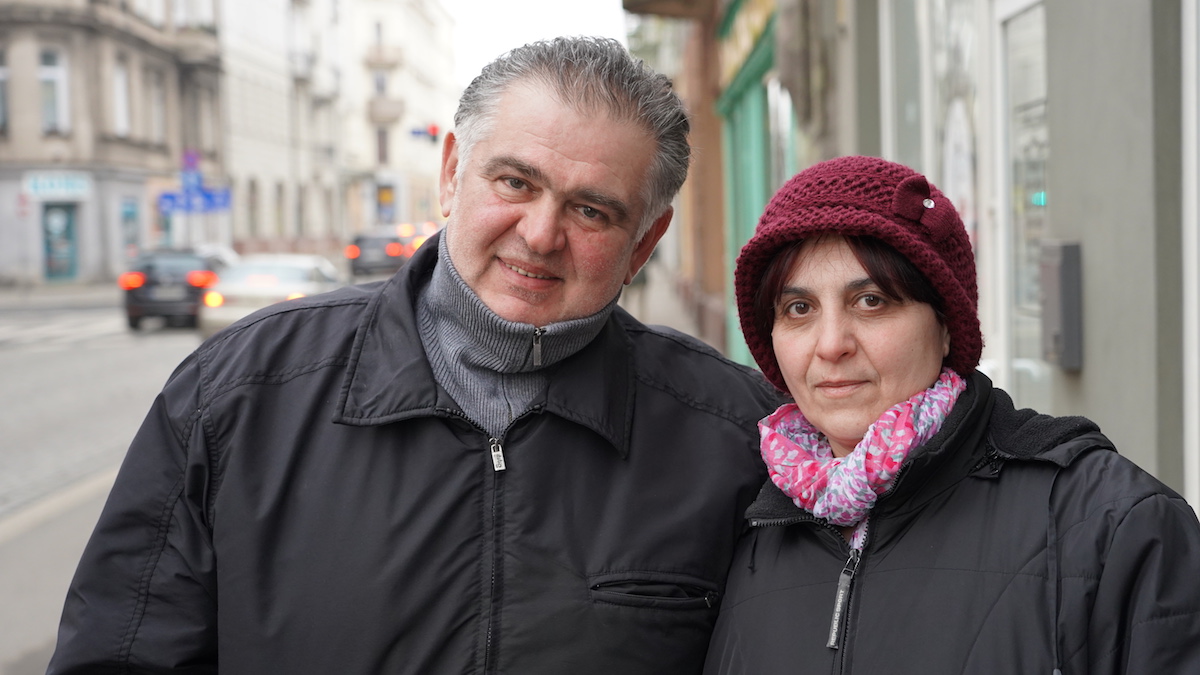
Maia and Zaza (52 and 57 years old) come from Kakheti in eastern Georgia.
They left their children at home. They say that unemployment in their homeland forced them to look for work abroad. Prior to that, they worked for three years in Israel – illegally.
“It is cheap to come to Poland. The main thing is that you get your documents and medical insurance drawn up here. Everything is legal, and nobody bothers you. The salaries are not so big, but what can you do – you can’t get half of this back home,” says Zaza.
However, not everybody is satisfied.
Gela (name changed) has been in Poland for six months, working in a warehouse of a large company in Gdansk.
He receives 80 zlotys [about 18.5 euros] per day. He says that he is dissatisfied with the conditions and would like to go to work somewhere in Western Europe.
“I have been deceived here more than once. I’ve been told there’s work for me. I show up, and instead of drywalling, they ask me to work in a different field. Transport here is expensive … it was just a waste of money.”
“I worked in a factory for 11 zł per hour. There was a Pole there in the same position as me, and he received 21 zloty. I ask why. They told me: because he is Polish”.
Gela is unhappy with other issues as well: “They don’t want to speak Russian at all. They won’t even tell you the bus number…but in Georgia we meet all foreigners with shashlik and khinkali.”
“Nobody to turn to”
Zurab Torchinava has lived in Wroclaw for over 20 years.
He received citizenship under the current president, Andrzej Duda, of which he is very proud. In his youth, Zurab was an acrobat and performed in the circus. He worked in Tbilisi as a troupe leader, but in the 1990s, there was no more work for him, so he decided to leave the country.
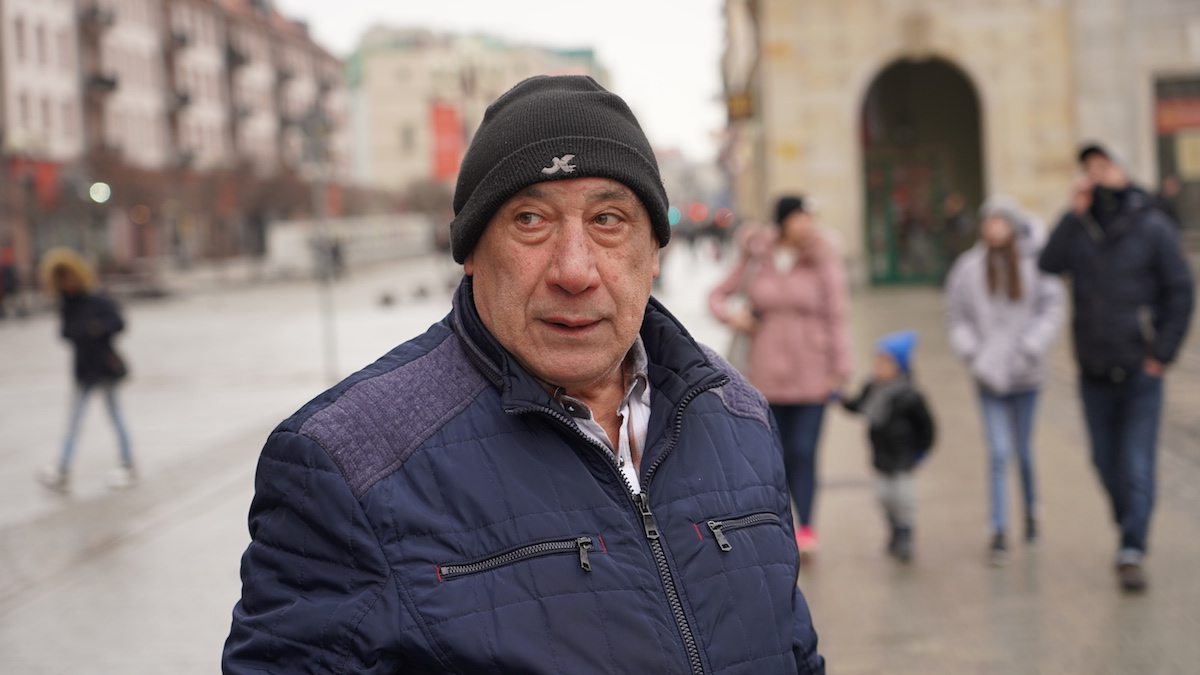
He got set up in Wroclaw and started a family. He speaks sparingly about his work: “I learned a craft, I did some construction, and now I work in security.”
Two years ago, Georgians began coming to Wroclaw to work – Zurab became a sort of informal defender and often the last hope.
On a voluntary basis, he consults compatriots, helps them with translation issues, negotiates with employers and middlemen and tries to solve wage-arrear issues.
During our conversation, his phone rang almost every minute.
Zurab says that the main problem of the majority of those who come is their lack of awareness, as well as insufficient qualifications:
“They are promised work and documents. But when they get here, it turns out that a person does not know how to do that for which he was hired. As a result, people are left without work and start looking for a new job.”
Zurab says there are many cases where people don’t get paid on time, and sometimes they don’t get paid at all – the period of legal residence ends, and they are forced to leave without their money.
This happened to Roland Kajai’s workmates at a construction site — Georgians with whom the leadership was not satisfied were soon dismissed. Some of them left, without waiting for the money already earned.
“They don’t say they won’t pay. They say ‘tomorrow’, ‘the day after tomorrow’ or ‘on Monday’. I don’t know a single Georgian here who has not had such a problem at least once,” says Roland.
Zurab Torchinava says that there are no lawyers or organizations defending the interests of Georgian migrant workers in Poland. And the migrants themselves have no money for lawyers.
“There is no place to complain. They are told that payment need to wait. And the workers have a 90-day period before they are forced to leave,” explains Zurab.
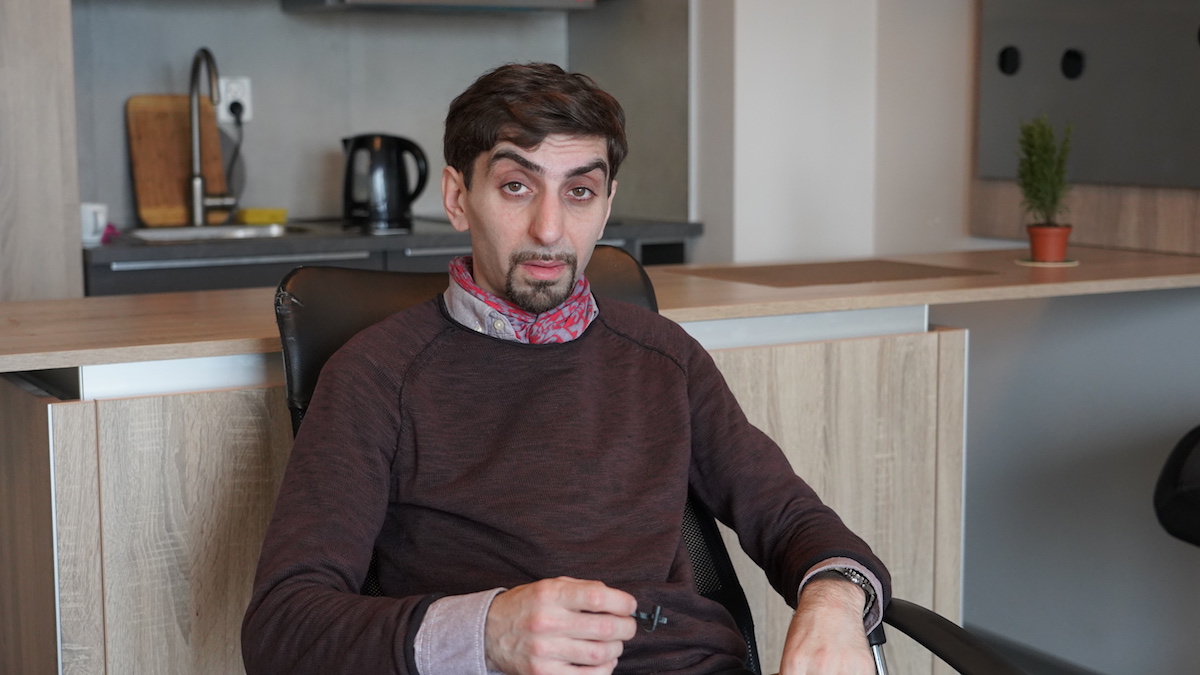
Lekso Akhalaia lives in Poznan. He is from Zugdidi in western Georgia.
He studied history at a Warsaw university, and did his doctoral studies in Poznan. He combines work in a distribution company with his own business – he brings workers from construction sites from Georgia, and now he is looking for a place in the old town to open a Georgian bakery.
He, like Zurab, is trying to help compatriots who find themselves in a difficult situation as much as they can.
Lekso says a lack of information is the main problem for Georgian migrant workers:
“They need to know where they are going, where they will work, what their profession is and what they can do. Around 90 per cent of those who come do not know, and say that Europe is there and ‘something will workout’.
In addition, migrants often suffer because of unscrupulous intermediaries.
“When people do not get paid, in eight out of ten cases, the intermediary is responsible for appropriating the money,” explains Lekso.
He says that, for example, the Embassy of Ukraine in Poland helps its migrants in an organized manner, including in obtaining delayed salaries, and cooperates in this matter with Polish departments.
“It would be desirable for Georgia to do the same,” says Lekso.
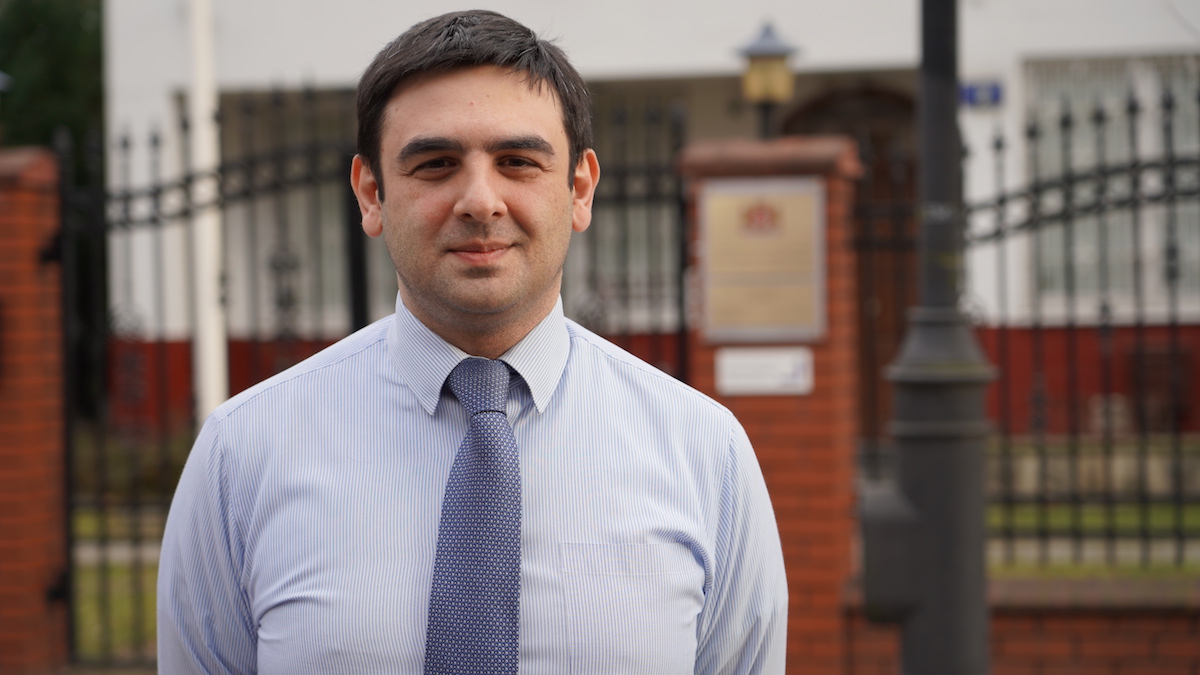
Temur Purtseladze, Counselor at the Georgian Embassy in Poland, told us that there is a hot line in the diplomatic mission where Georgian citizens can ask for help.
Purtseladze says people are generally interested in learning how they can work in Poland, and also appealing for help in getting their salaries.
“We try to help as much as we can,” says Purtseladze, but notes that the wave of Georgian migration to Poland is chaotic, and it is difficult for Georgian officials to deal with the increased scope of work.
Cezary Kaźmierczak says that the scale of labour migration in Poland practically took the Polish migration authorities by surprise. And this is precisely the reason for the problems that migrants face.
“The state simply cannot cope with such an influx of people,” says Kaźmierczak.
How difficult is it to get legal residency?
In order to legally apply for a job in Poland, it is necessary to obtain a temporary work permit.
To do so, the employer must apply to the urząd – local authorities. As a rule, this process takes several days, though a permit is valid for a period of six months to a year.
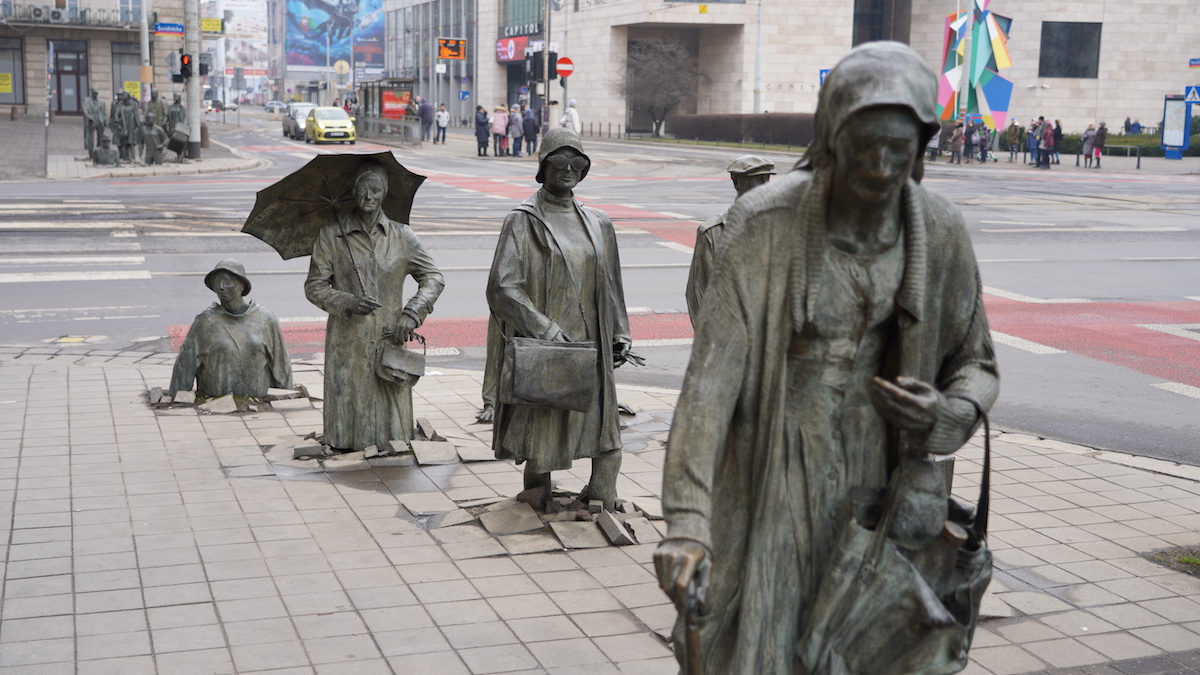
You can also apply for a temporary residence permit for three years. To do this, you must submit documents from your place of work and rental housing, as well as pay a fee of 450 zł [about 100 euros].
Due to the large influx of migrants and the workload of the Polish migration service, waiting for a residency card takes a long time – often more than a year. However, the person who applied for the card has the right to legal residence and work in Poland in the meantime.
The process of recruiting personnel among foreigners is trusted to intermediary companies by most Polish businesses.
In Poland, such companies are largely managed by Ukrainian citizens. Most of the vacancies are announced by intermediaries for free – that is, the services of intermediaries are paid for by the employer.
In turn, Georgian intermediaries cooperate with intermediaries from Poland who provide them with current vacancies.
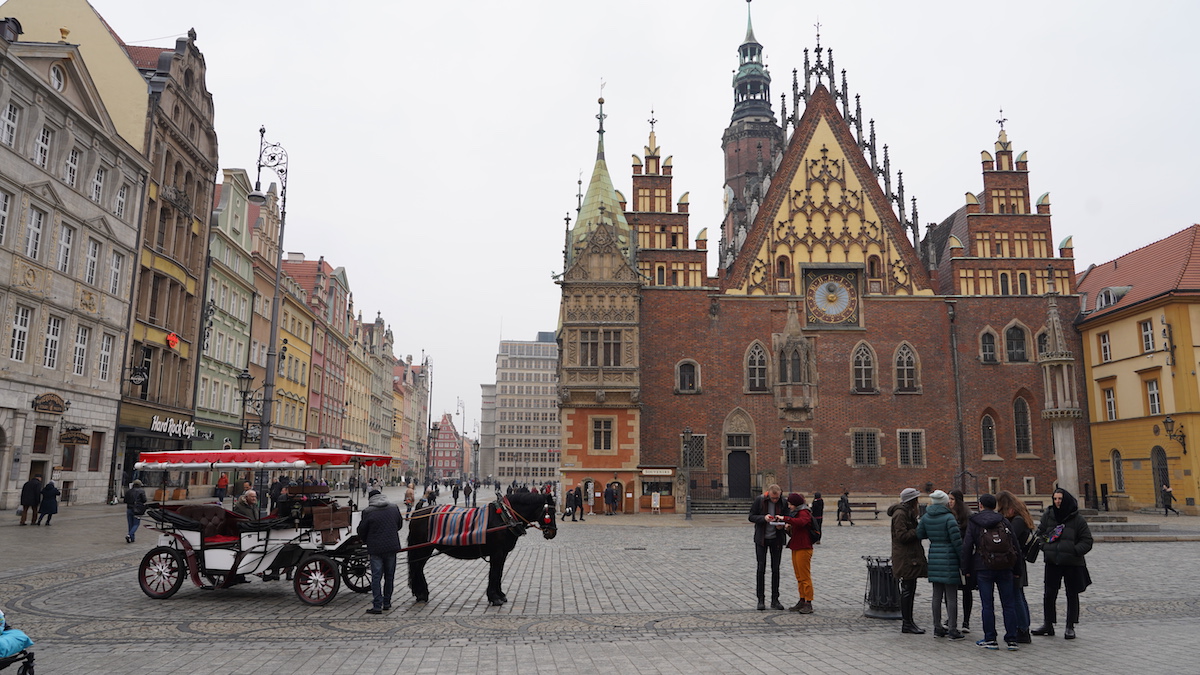
Poland – pluses and minuses
– The main plus point of labour migration to Poland is the availability of legal work, including for low-skilled workers.
– A big plus, mentioned by all we spoke to, is the attitude of the local population towards Georgia and Georgians. The Poles mainly treat Georgians very positively.
– One minus for Georgian migrants is the relatively low wages (compared with Germany, Greece, Italy and other Western European countries). “Keep in mind that if a person has a big financial problem, work in Poland will not solve it. The maximum that can be sent home is $500 a month,” Zaza Nesuashvili explains to us.
The language barrier
Unlike Ukrainians and Belarusians, Georgians do not know and do not understand Polish easily.
Many also do not know Russian. This creates a number of problems, and sometimes puts one’s job at risk.
When you don’t understand what your boss says to you, when they tell you to do one thing, and you do something else — who will keep such a person at work?” says Roland Kajaia.
Zaza Lobzhanidze says that he was hoping his knowledge of English would help, but that in Poznan this did not give him any advantages. But knowledge of Russian did as it was easier to communicate with companies through intermediaries, where Ukrainians mostly work.
Knowledge of Russian helped Maia and Zaza Nesuashvili – they communicate with their superiors through their Ukrainian colleagues.
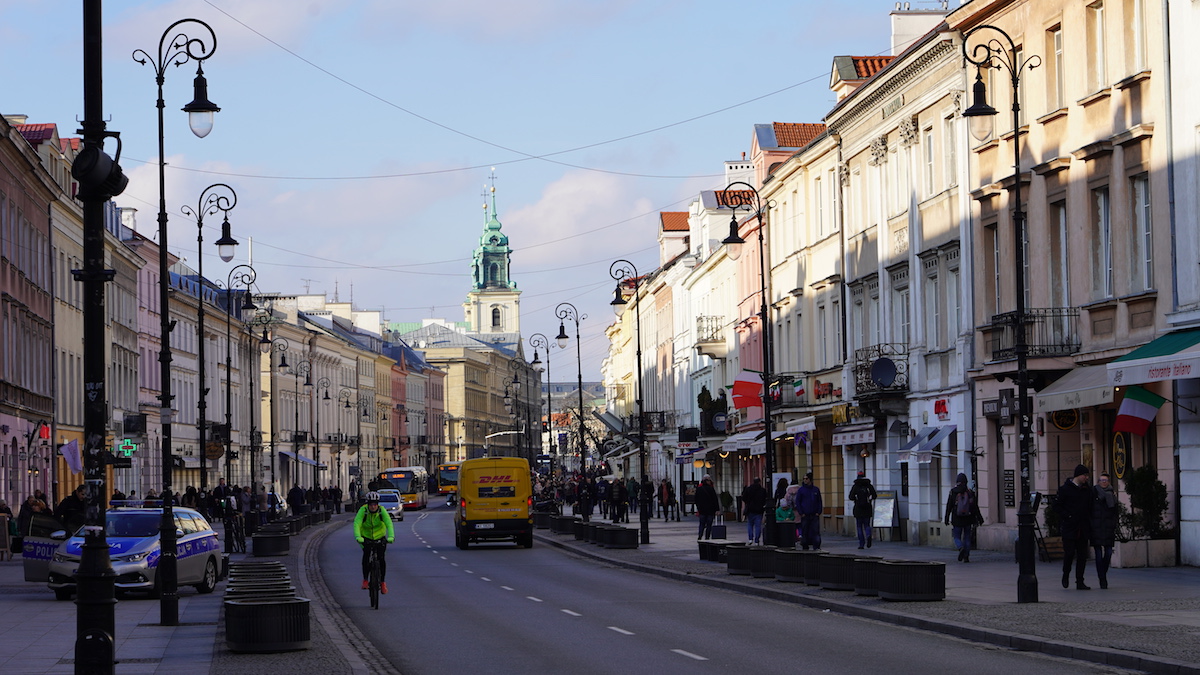
Lekso Akhalaia advises those who wish to come to Poland to study the Polish language in advance, at least at an elementary level. Zaza Lobzhanidze says that she goes to Polish courses provided by the state for only 75 zlotys [about 17.5 euros].
Maia and Zaza Nesuashvili say that they see no reason to learn Polish as they don’t need it for work, and they don’t intend to remain in Poland.
Intermediary agencies
We dialed up a work agency that advertises on Facebook.
We were told it had no vacancies at the moment.
The agency’s services cost 300 euros, which includes a ‘guaranteed workplace’.
The agency recommends arriving in Poland through visa-free travel, but does not organize residency permits.
The agency sends up to 50 people per month to Poland.

Another intermediary agency requested $400 for its services. Among the proposed vacancies were jobs in factories, construction, restaurants and warehouses.
Their service package, as they explained to us, includes the design of an invitation letter for six-month or one year work visa, and ‘direct escorting to the place of work’.
Again, the issue of residency permits must be solved independently.
According to the law of Georgia on migration workers, since 2015, all mediation activities for the provision of work abroad are regulated.
Giorgi Bunturi, head of the migration department of the Ministry of Labour and Health and Social Protection of Georgia, said that intermediary companies are required to register in the public register according to their occupation and provide regular reports every year. There is a fine for violations ranging from 300 to 1,000 GEL [approximately $110-370].
Currently, up to 60 companies engaged in labour migration abroad work in Georgia.
“The job seeker must follow the process closely, and he has to make sure that he actually receives a work permit as well as become familiar with the employment contract,” says Bunturi.
Bunturi says that there are unscrupulous companies working in Georgia who deceive people:
Giorgi Bunturi says that the Georgian government is looking for ways to conclude agreements with other EU countries to open up the possibility of labour migration for Georgian citizens.
From 1 February, an agreement with France will come into force, though this is for specialists.
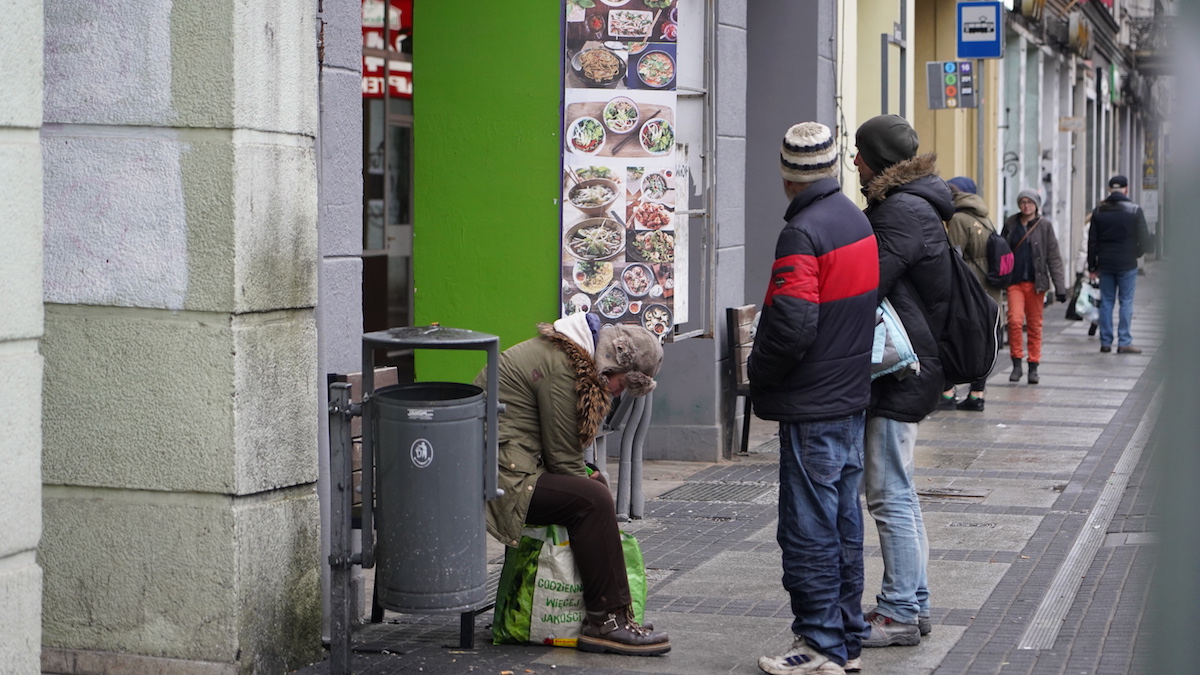
The first process of legal labour migration to Poland was launched by the International Organization for Migration in 2015 as a pilot project.
According to the head of the programme in Georgia, Natia Kvitsiani, during this time, 32 people were employed in the project.
“A model has been created that can be used with other countries,” explains Kvitsiani.
Poland, experts say, will be in continuous need for labour for many years to come.
“By 2050, the labour shortage in Poland will be five million people. If something does not change, we will continue to invite migrants,” Kaźmierczak says
He adding that Poland is lucky in that the foreigners that come to the country largely do so for work, and not to receive benefits, as in some other Western European countries.
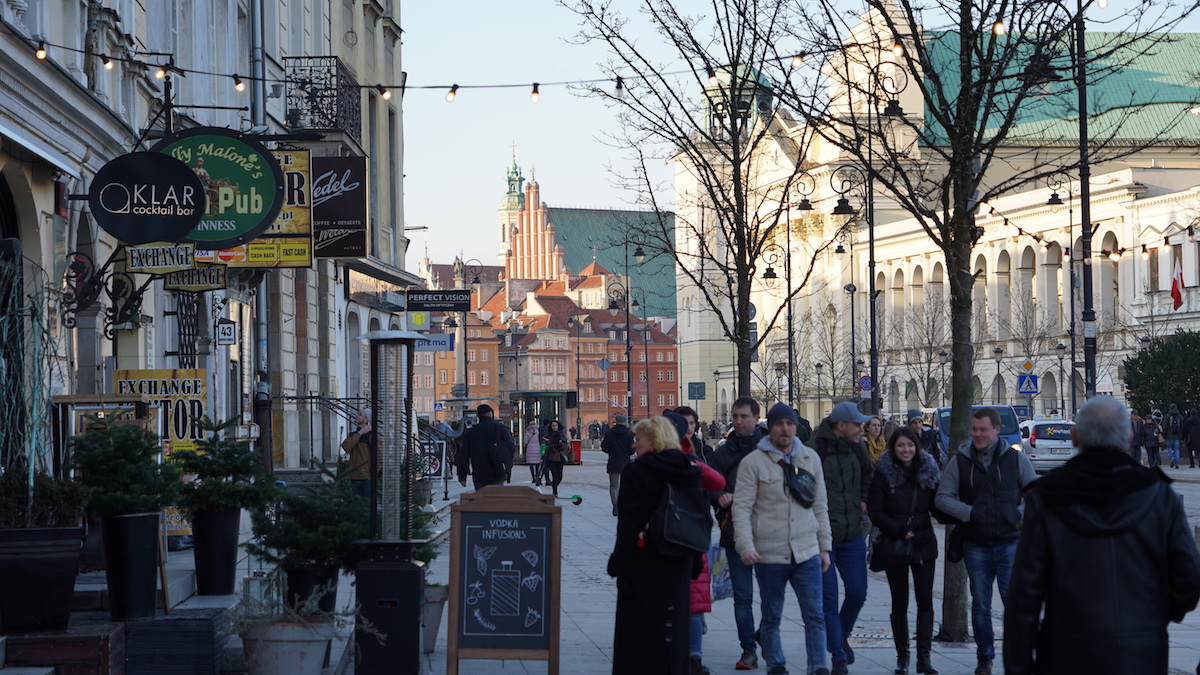
Home is best
Few of the migrant workers we spoke to in Poland plan to stay in the country for a long time.
“If we could earn even 500 lari [about 165 euros] a month in our homeland, we would return without a second thought,” says Maia Nesuashvili.
Zaza Lobzhanidze categorically denies the possibility of staying in Poland: “As soon as everything is settled in our country, I will return.”
“I do not consider work in Poland to be a success. Real success would be a good job or my own business in Georgia,” says Roland Kajaia.


















